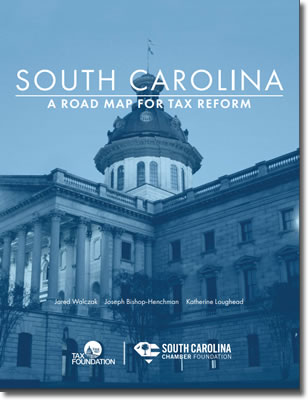By Andy Brack, editor and publisher | The newly-found political buzzphrase among the South Carolina legislative class is “tax reform.”
 Suddenly, after years of hemming and hawing about doing something about the hodge-podge of laws that make up the state’s tax code, there’s a little juice to do something real to stabilize the tax structure and, we hope, make it a little bit fairer up and down the line.
Suddenly, after years of hemming and hawing about doing something about the hodge-podge of laws that make up the state’s tax code, there’s a little juice to do something real to stabilize the tax structure and, we hope, make it a little bit fairer up and down the line.
There’s a glimmer of hope for the hard work of changing and updating the tax structure thanks to a new 129-page report commissioned by the S.C. Chamber Foundation and done by the Tax Foundation, a national research group. This new Roadmap to Tax Reform describes the complications and sheer bulkiness of how the state of South Carolina levies taxes. For example:
On the state income tax: It “features the highest top marginal rate in the Southeast, and the highest effective rates in the region for many wage earners.”
On sales taxes: They are “imposed on an extremely narrow base that exempts many goods and most services, a holdover from an earlier era.”
On property taxes: “Act 388 remade the property tax landscape in South Carolina – and not in an entirely positive way. The exceedingly light taxation of some classes of property has resulted in heavy, uncompetitive burdens on others.”
On user fees and more: “A robust, and often byzantine, system of fees in lieu of taxes has emerged to offset an otherwise deeply uncompetitive property tax system for many businesses. Meanwhile, local governments choose among a bevy of tourism- and accommodation-related taxes, each with their own structures.”
 In other words, the way the state of South Carolina taxes is a big hot mess. It got that way because lawmakers of the past tried to patch, repatch and cover over a structure that was weak and needed to be modernized. Why didn’t they just fix it with something better? Because that’s hard work. Comprehensive tax reform has a lot of moving pieces and for it to be done right, there’s got to be a lot of balance and compromise, two values that aren’t found much these days in the political arena.
In other words, the way the state of South Carolina taxes is a big hot mess. It got that way because lawmakers of the past tried to patch, repatch and cover over a structure that was weak and needed to be modernized. Why didn’t they just fix it with something better? Because that’s hard work. Comprehensive tax reform has a lot of moving pieces and for it to be done right, there’s got to be a lot of balance and compromise, two values that aren’t found much these days in the political arena.
The Tax Foundation report suggests the impetus to reform the tax code is to make South Carolina more competitive with other states because the current system makes us lag in more ways than one: “Underlying our analysis is the goal of enhancing South Carolina’s competitive standing and a commitment to the principles of sound tax policy – that, to the greatest extent possible, taxes should be simple, transparent, neutral and stable, and that the best tax structures are those with broad bases and low rates.”
We’ve been pushing those basic economic principles for a dozen years since the 2006 publication of Doing Better: Progressive Tax Reform for the American South by the Center for a Better South.
So here’s the practical problem in South Carolina: Can tax reform be done in a way that can be fair but also generate enough revenue to deal with decades of underfunding that caused some of the worst public schools in the country, public colleges with high tuition, crumbling roads, unsafe bridges, health problems that are among the nation’s worst, and on and on?
Tax reform, if it is real, can’t just mean a rejiggering of the state’s tax structure to make it revenue-neutral. An updated tax structure needs to fuel more investment so we can get out of the hole in education, roads and health care. In turn, that will make us more competitive over the long term. Having high quality education, roads and health care is why people will move here. Merely rearranging the tax chairs on the deck of the Titanic without investing more to make us greater will do little to push South Carolina forward.
We applaud the Chamber and Tax Foundation for their hard work to engage legislators in what will be tough discussions and hard decisions. But if we want real and comprehensive tax reform to make the Palmetto State truly competitive, a new tax structure must be simple and fair to all – but also generate more money to make up for what was not done right for decades.
- Have a comment? Send to: editor@charlestoncurrents.com




 We Can Do Better, South Carolina!
We Can Do Better, South Carolina!
























